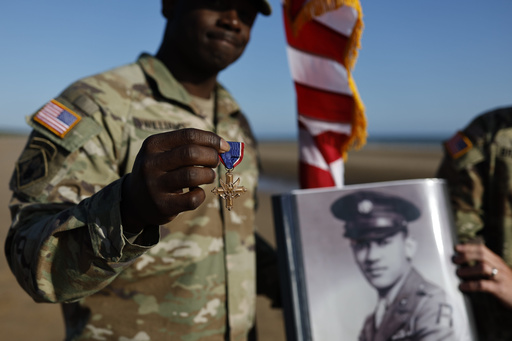OMAHA BEACH, France (AP) — A medal richly deserved but long denied to an African American combat medic wounded on Omaha Beach in the D-Day landings was tenderly laid Friday on the hallowed sands where he saved lives and shed blood.
U.S. First Army soldiers held a ceremony in honor of Waverly Woodson Jr. on the beach where he came ashore and was wounded, and where hundreds of American soldiers were killed by withering fire in the June 6, 1944, landings in Normandy, northern France.
The Distinguished Service Cross is the second-highest honor that can be bestowed on a member of the U.S. Army and is awarded for extraordinary heroism.
The medal was awarded posthumously to Woodson this month — just ahead of the 80th anniversary of D-Day — following years of lobbying for more recognition of his achievement on that fateful day.
U.S. First Army Maj. Gen. William Ryan gently placed the World War II-era medal on the sand, close to the spot where Woodson is thought to have come ashore on the now-peaceful beach that on D-Day was raked by German machine-gun and artillery rounds before U.S. forces finally captured it and started pushing inland.
The soldiers all saluted, still and quiet under blue skies, when U.S. First Army Command Sgt. Maj. Christopher Prosser gave the order to present arms.
U.S. First Army historian Capt. Kevin Braafladt explained to the soldiers that the next step would be the medal’s presentation to Woodson’s widow, 95-year-old Joann. It will be given to his family in a ceremony later this summer.
“We want to be able to say that this medal came from Omaha Beach and was at the site of Woodson’s actions,” Braafladt said.
The soldiers delicately passed the medal from hand-to-hand, feeling its weight and inspecting it.
The ceremony moved U.S. First Army Staff Sgt. Aaron Williams, who is Black, to tears.
“Understanding my position as an African American and to learn about Corporal Woodson and everything he experienced here on Omaha and in Normandy is very touching to me, and to be here in the exact spot, it’s just historic,” Williams said. “It’s very, very touching.”
Woodson was just 21 years old when his First Army unit, the 320th Barrage Balloon Battalion, took part in the Allied operation that helped precipitate Adolf Hitler’s downfall 11 months later.
Woodson’s battalion, the only African American combat unit on Omaha that day, was responsible for setting up high-flying inflatable balloons to prevent enemy planes from buzzing over the beach and attacking the Allied forces.
At a time when the U.S. military was still segregated by race, about 2,000 African American troops are believed to have taken part in the D-Day invasion.
Woodson died in 2005, at age 83, and is buried at Arlington National Cemetery.
His son, 66-year-old Stephen Woodson, fought back tears Friday when The Associated Press described the ceremony to him by phone.
“I’ve got chills,” he said. “My father is receiving a lot of attention that is long overdue. It’s almost beyond words for me to describe how important this is for my family.”
Waverly Woodson himself spoke to the AP in 1994 about how his landing craft came under intense fire from German gunners as it approached the beach.
”The tide brought us in, and that’s when the 88s hit us,” he said of the German 88mm guns. “They were murder. Of our 26 Navy personnel there was only one left. They raked the whole top of the ship and killed all the crew. Then they started with the mortar shells,” Woodson said in the interview.
For the next 30 hours he treated 200 wounded men while under intense small arms and artillery fire before collapsing from his injuries and blood loss, according to accounts of his service. At the time he was awarded the Bronze Star.
Although 1.2 million Black Americans served in the military during World War II, none was among the original recipients of the Medal of Honor awarded in the conflict.
The Army commissioned a study in the early 1990s to analyze whether Black troops had been unjustly overlooked during an era of widespread racism and segregation in the military. Ultimately, seven Black World War II troops were awarded the Medal of Honor in 1997.
___
Associated Press writer Rebecca Santana in Washington contributed to this report.
Source: post





